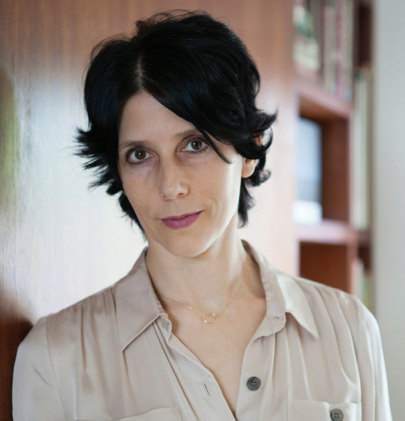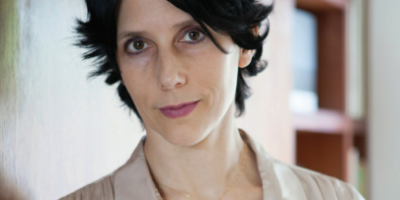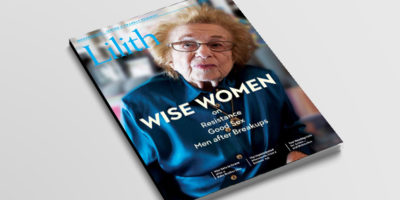
Rape & Recovery
Karyn Freedman tells Judy Gerstel about the memoir of sexual violence that has students and all of Canada listening.

Photo: Regina Garcia
Karen, your book, One Hour in Paris: A Story of Rape and Recovery, is an intimate and detailed account of the sexual attack and violence you experienced as a 22-year-old backpacking in Europe in 1990. It’s chilling and, paradoxically, also a heartening read. You describe both the harrowing attack — by a stranger at knife-point — and also unspool the slow process of recovery from this assault. What made you decide to write about it 25 years later?
I had reached a stage in my own recovery where it felt safe, and I thought that maybe by looking inward I could share something others could connect with. I also wrote the book for political reasons, in particular defiance against the victim- blaming narrative.
Was fear that you’d somehow be blamed why your first instinct was to hide that you were raped? Why did it seem important at the time to keep it secret from everyone but your immediate family and a couple of close friends? You were still a student then, living at home with your parents. Did the secrecy have anything to with being part of a small, close-knit Jewish community in Winnipeg?
Stories like mine have always been kept secret because there is so much shame and guilt in the wake of sexual violence. I was already burning up with all those feelings—but I was very lucky in that I didn’t experience any judgment or blame from the people I did tell.
You mention you were also lucky to find a wonderful therapist, who guided your recovery after years of flashbacks, panic attacks, paralyzing fear and difficulties with relationships and sex. But can a person ever completely heal from such brutal sexual violence?
Experiences like this are transformative. You’re not who you were before. Deeply traumatic experiences can wreck us. They can wreck you for years, and, in some cases, forever. In the first few years after the rape, the relationships I’d get into were so messed up. Intimate romantic relationships were a nightmare. For a while I thought I’d never be normal, never have a normal relationship. The guys I ended up with were good, kind people, but I found it near impossible to have sex, or at least, impossible to enjoy it. I was plagued by intrusive thoughts and flashbacks about the rape. There was always some touch, some intimate act, that brought me back to Paris, 1990. It was exhausting.
Aside from romantic relationships, another thing that changed for me after the rape was my general level of anxiety, which basically went through the roof. I had a hard time modulating my emotions. I was caught in a state of post- traumatic stress, and was experiencing the typical range of symptoms of P.T.S.D. I found myself in a constant state of hyper-arousal, always on guard and alert to my surroundings, never relaxed. I had intrusive thoughts and flashbacks, and I was easily startled, jumping at the sound of an innocent but unexpected noise, like a phone ringing or a knock on the door. And, like many people who experience trauma, I was stuck in the expectation of catastrophe—always fearing the worst, as if I couldn’t risk not preparing myself for what might be coming next.
But if you’re lucky enough to have the right support, and be in the right time in the right kind of society, maybe you can look at that wreckage and put yourself a bit back together. But when you do, you’re not quite who you were before.
I do think you can live a reasonably happy life. Coming out of these experiences that wreck us, your emotional life can be disastrous or tolerable—or okay. You have to be lucky to have all the pieces in place. It took over a decade before I was even ready to try.
It’s now more than a decade that you’ve been living with your partner, whom you thank in the book for his unwavering support. You even mention that the closing for the house you bought together was on August 1, the same date the rape took place, and that is no longer a date that you dread. Have you come to see your life divided into pre-rape and post-rape?
I might have, 10 or 15 years ago. For the first decade after, my life was so deeply marked by rape and I was in such a bad place by not having dealt with it, there was definitely “before” and “after.” I was 22 when it happened, and I’m 48 now. The markers for me now are when I started dealing with the rape. Pre-therapy and post-therapy are the significant markers now.
Dealing with the rape also meant several trips back to Paris. You write about traveling with your partner to find out whether your rapist died in jail. You write that the news that he had completed his sentence and had been released somehow, moved you forward, “closer to the end of the story.” Was writing the book part of the healing?
I think other people see it as a stage in my healing journey. It did end up being that in a way, but writing the book wasn’t a therapeutic endeavor. It was a creative endeavor. I’m used to academic writing, and this was my first creative nonfiction; it was a very enjoyable undertaking. I started writing in the fall of 2008 and the whole process of getting it published seemed to take forever. Now that it’s a few years behind me, I’m able to see that it did function as a healing process—not the writing but putting it out there in the world.
Did you feel it was the ultimate way of finally getting back at the man who raped you (and then spent eight years in a French jail for the crime after you brought charges against him)?
That might be a satisfying narrative, but it wasn’t that way at all. I didn’t feel like this was my “fuck you” to my rapist.
What about when the book was published and receiving media attention? It’s very much still in the spotlight, since it was nominated recently for Canada Reads, the 2017 competition sponsored by the Canadian Broadcasting Corporation to select “the one book Canadians need now.”
Before it was published, I was entirely uncertain about how I would feel, how my body would feel. I didn’t know what to expect. Just before we published it, I wondered whether it would cause me to regress in my therapeutic journey. But I’ve come to understand that keeping the story hidden and secret only compounds the shame we carry around with us.
Walking into a room with people who have read the book is a most comfortable feeling. It further integrates the experience into who I am. People know this impor- tant fact about me without my having to tell the story. I don’t feel particularly exposed or vulnerable. It wasn’t triggering, it was solidifying.
It’s a funny thing, carrying around a story like this that’s so deeply transformative of your life. You meet people at a party and it doesn’t come up and then you see them again and become friends with them and they don’t know this thing about me. It acts as an obstacle. That was the most surprising consequence. I couldn’t have predicted that [having the book out there] would make me feel so much at ease with people.
Did you have to think twice about whether to include all the intimate details about the sexual violence you experienced and your later problems with sex in relationships?
I never wrestled with that. I’m a university professor. Therefore I work in a context in which young women are particularly vulnerable. Students who read my book and come into my office are so deeply grateful. There’s never a moment when I think even twice about the intimate details I’ve shared. I could not have written this book and held back.
Do you feel more hopeful now that rape is getting more attention? Do you think that society can change so that sexual violence itself becomes taboo?
It’s about the social norms that society is prepared to accept. And for a long time we’ve been prepared to accept men’s violence against women. But I do think that we’re increasingly less prepared to accept it.
Still, it happens in every community. Certainly, in the more orthodox patriarchal communities, there’s less freedom in general for women, and that would mean less freedom to speak out against improper treatment.
In the lefty, Jewish feminist Lilith community, it probably happens just as everywhere else, but I think more women are speaking out.
Until people speak out about these things, it’s very hard for society to shift, to understand what it means to experience sexual violence and how it impacts our lives, our sex lives, romantic lives, everyday existence.
The thing that seems to help is hearing these first-person narratives. But I do think there’s a tricky bind there. I don’t want to impose a requirement on other survivors to speak out, women who are already vulnerable and marginalized.
I wouldn’t want to impose the requirement to speak out on anybody. However, if someone happens to be in a position of privilege as I am…
I risk very little in speaking out. I felt I had a moral obligation to do that. I think in telling my story other people are able to understand what it’s like to experience sexual violence, and the trauma that is its aftermath. Hopefully they can also see the possibilities for recovery.
Judy Gerstel is a Toronto-based writer and former critic and editor at the Toronto Star and Detroit Free Press.



